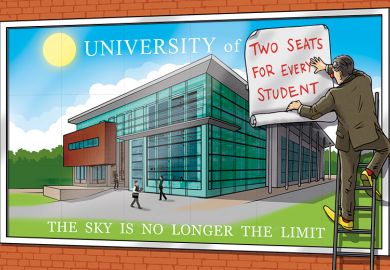Universities’ general staff will increasingly be tapped for academic leadership positions that have traditionally gone to professors, an Australian recruitment specialist has predicted.
Rosalind De Sailly said that leadership needs were already “blurring” when universities recruited heads of their teaching and learning innovation divisions. “People can come at that [job] from different backgrounds,” she told the Remaking HE conference.
“They might have a PhD. They might be publishing in the scholarship of teaching and learning. Or they might have come from a different angle, yet they are bringing equally credible insights and experience to the role.
“That is one area where I have been able to advocate for an appointment to be academic or general, depending on the candidate,” said Dr De Sailly, who heads an executive search agency focusing on universities and research institutions.
She said that she expected more “shifts” in approaches to recruitment, although the landscape was confused by different conceptualisations of academic and professional roles in different countries. For instance, chief librarian positions in the US were considered academic posts.
That made it difficult for an Australian recruitment firm to lure American library specialists, who had titles such as dean or pro vice-chancellor in their home country. “For them it’s not attractive to come here [where] university librarians are seen as professional staff roles.”
Dr De Sailly said that roles with line management responsibilities for the disciplines would be “hardest to change” in terms of recruitment habits. She said the person chosen as dean of engineering may always be a professor of engineering – and “maybe needs to be”.
Still, less regard should be paid to strong research records when disciplinary leaders were recruited, she insisted. “That is a very selfish pathway to success,” she told the forum.
“We’ve seen that in grant allocations. People are giving money to their mates, who they know will give money to them – keeping the money to themselves [and] running labs where they pretty much subjugate everybody.”
Dr De Sailly said appointment panels needed to pay more attention to candidates’ “trajectory and potential” and less to stellar research records built up over decades – instead, focusing on achievements over the past three to five years.
She said that some researchers accrued publications over 25 years of “uninterrupted time in the lab”, but their recent output was “not really connected to where the field is heading. It might not be as strong compared with what someone has been doing over a shorter [period].”
Panels should not be swayed by an “uninterrupted privileged ride”, she said. “Someone who’s gone through, let’s say, life – what future vision is this person bringing?
“Some people are appointed because they’ve done it before. They’re just going to come in and do it again. Is bringing in something that they’ve done somewhere else really the best thing we need, when our universities need to be more engaged with their local communities, regions and industries?”
Register to continue
Why register?
- Registration is free and only takes a moment
- Once registered, you can read 3 articles a month
- Sign up for our newsletter
Subscribe
Or subscribe for unlimited access to:
- Unlimited access to news, views, insights & reviews
- Digital editions
- Digital access to THE’s university and college rankings analysis
Already registered or a current subscriber?




